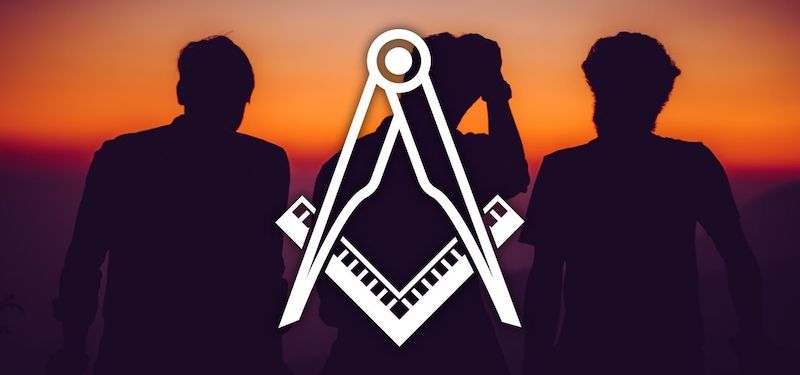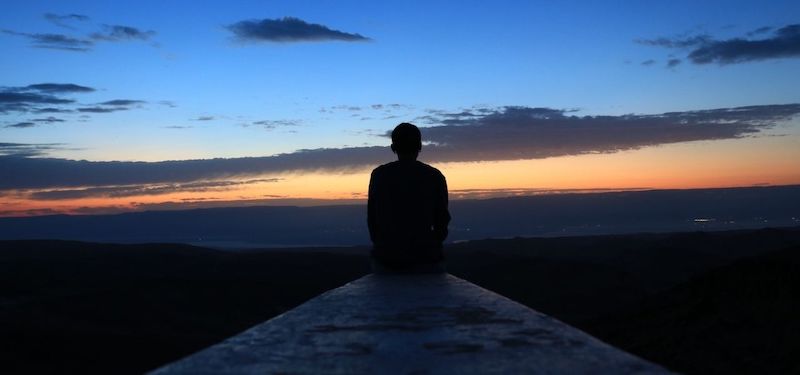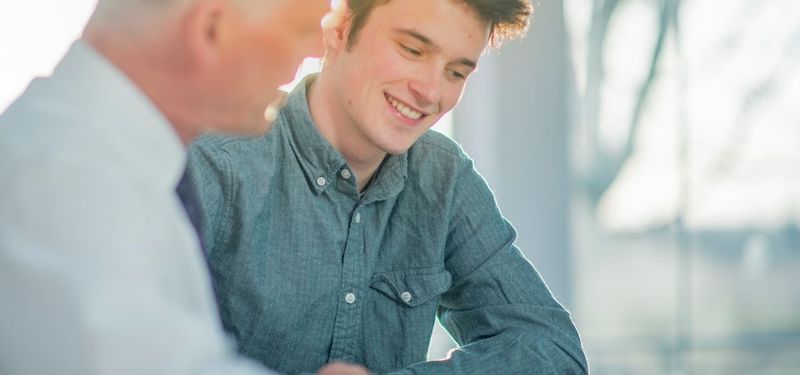When asked, “what does Freemasonry do?”, one of the answers we tend to give is
“Freemasonry takes good men and makes them better.”
But what does this really mean?
How does Freemasonry make good men better?
We can approach this question in a variety of ways.
There are first of all the lessons in the degrees which train our mind and guide our actions.
Then there is our exposure to Masonic mentors and role models, and finally, there is the role we fill as Masonic teachers.
So let us briefly explore each of these aspects in turn.
We should begin by simply reviewing the written work of the three degrees for the guidance they provide.

The Entered Apprentice Degree
In the Entered Apprentice Degree, we are taught equilibrium, learning through the twenty-four-inch gauge, that we should divide our day into three equal parts:
- eight hours for the service of God and the relief of a distressed worthy Brother
- eight for our usual vocations, and
- eight for refreshment and sleep.
This means that we are to think about our spiritual wellbeing and the wellbeing of others first, to be gainfully employed, but also not to neglect our rest and relaxation.
We learn through the common gavel to get beyond the passions and exigencies of today and, by divesting our hearts and consciences of all of the vices and superfluities of life, to fit our minds as living stones for that spiritual building – that house not made with hands – eternal in the heavens.
We are taught three guiding principles: to have faith in God, hope in immortality, and charity toward all mankind.
We are told that the greatest of these is charity, and Freemasonry, at every turn, encourages us to go beyond good thoughts toward positive action.
From Rough To Perfect Ashlar
We learn too that reaching our potential does not occur overnight, and through the symbolism of the ashlars, we come to understand that it is the work of a lifetime to move from the Rough Ashlar, which is symbolic of our rude and imperfect nature, to the Perfect Ashlar, which is that state of perfection we hope to attain by a virtuous education, our own endeavors, and the blessings of God.
We learn about the point within a circle, embordered by two perfect parallel lines representing the Holy Saints John, and on the top resting the Book of Constitutions, and are told that while a Mason keeps himself within their precepts, it is impossible he can materially err.
What this means is that not only are we to practice what is in the Book of Constitutions, but also to temper the righteousness and zeal of St. John the Baptist with the love, charity, and mercy of St. John the Evangelist.
The 3 Core Tenets of Freemasonry
We learn about the three tenets of Freemasonry.
The first is brotherly love, by the exercise of which, we are taught to regard the whole human species as one common family.
It is upon this principle that the universality of Freemasonry is based.
In our Fraternity are men of every country, sect, and opinion, and through brotherly love, we find true friendships with those who we might otherwise have never even met.
The second is relief. We believe that everyone should try to help the distressed, but we believe that it is particularly incumbent upon Masons to go the extra mile to soothe the unhappy, sympathize with their misfortunes, show compassion for their miseries, and restore peace to their troubled minds.
This means that while giving money, to the extent we can, is helpful, it is also the person-to-person interaction that is so important.
The third is truth, which we are taught is the foundation of every virtue.
As Masons we should be known as men to whom hypocrisy and deceit are unknown, who deal honestly and fairly with all men, who promote each other’s welfare, and who are happy rather than jealous of each other’s prosperity.

The 4 Cardinal Virtues
Finally, there are the four cardinal virtues.
The first is temperance, a restraint on unbridled passion, and the cultivation of moderation rather than excess in everything we do.
It keeps drinking from becoming drunkenness, love from becoming an obsession, and discussion from becoming an argument.
The second is fortitude, which allows us to do what is right in the face of pain, peril, or danger, but which also is equally distant from cowardice on the one hand and rashness on the other.
The third is prudence, the hallmark of which is reason and common sense, along with a concern for the longer-term consequence of our actions, not merely its short-term effect.
And finally, justice, that standard of fairness and right which enables us to render to every man his just due without distinction.
Here are a number of significant principles to guide our lives, and we have discussed only the Degree of Entered Apprentice.
There are equally powerful lessons to be drawn from an examination of the Degree of Fellowcraft and the Degree of Master Mason, but we do not have time to cover these now.
However, you are strongly encouraged to study the valuable teachings they contain.
Moving from the role of our ritual in helping to make good men better, let us next consider the part played by our Masonic mentors and role models.
Masonic Mentors & Role Models

New Masons are very conscious of the behavior of the Masons in their Lodge.
They wonder if these Masons comport themselves differently from other men they know who are not Masons.
They observe how well these older Masons live up to the solemn obligations they have just taken, and measure their conduct to see if it is congruent with the lofty principles and high moral standards espoused in the three degrees.
Most of the Brethren live up to these standards and the new Masons learn more about Freemasonry from these men than they do from taking the degrees or reading a myriad of books about Freemasonry.
What is most impressive about these Masonic role models is how accomplished they are, and yet how modest.
They wear their success and titles very lightly, have little interest in the spotlight, are very approachable, and are very pleasant to be around. We quickly learn that they keep their promises and that their word is their bond.
We find that we can talk to them on the square and be confident that what we share will go no further.
We can trust them with our innermost thoughts and concerns, so we trust them with our money and even our family.
These mentors and role models are not somehow superhuman, they have the same feelings or sensibilities as the rest of us, but when they are upset, they seem less quick to anger and are better able to keep their emotions in check.
They feel as deeply as anyone else when they are slighted or insulted, but they opt to be courteous rather than disagreeable, conciliatory rather than offensive.
They remember past wrongs and injustices like anyone else, but they are willing to forgive, and not to hold grudges.
They are as aware as anyone else of a missed word, a mistake in the floor work, or a gaffe in Masonic protocol, but they pretend not to notice in order to avoid embarrassing their Brother. And although they may suffer from the same financial pressures as anyone else, they are still willing to share what they have in order to help a Brother or their Lodge.
It is this attitude of charity and forgiveness that distinguishes them as Masons.
It is their demeanor that wins our respect. And by their conciliatory attitude and agreeable disposition, they promote peace and harmony in the Lodge.
Having touched upon the role of ritual and of our own Masonic mentors, let us finally consider the part that each of us might play, if we choose, as mentors and role models for the next generation of Masons.
Assuming the role of mentor gives us the opportunity to help others to become better men, but it also helps us improve ourselves even more because it is by teaching that we learn the most.
Being a mentor can, of course, involve instructing on the ritual, explaining Masonic protocol, reviewing the history of our Lodge and its traditions, and teaching about Grand Lodge.
Freemasonry’s History
It also should involve discussing Masonic history and philosophy, delving into the deeper meanings of Masonic symbolism, and exploring moral and ethical issues with our Brethren.
However, as hinted at throughout this article, mentoring also is teaching by example.
When we think seriously about Freemasonry, we know that its foundation is the relationship between its members, and perhaps more important than perhaps anything mentioned above, is simply being a friend.
Sometimes, we can provide material help when a Brother is in trouble, but more often simply being there to offer moral support to a Brother who is upset, giving comfort to a Brother who is sick or grieving, and being with a Brother to share his joys and his successes, is what really is needed.
A smile, a cordial greeting, a pat on the back, and a willingness to listen is so greatly appreciated, and a single phone call, or visit to a sick or grieving Brother is worth more than a thousand lectures on friendship.
Closing Thoughts
In summary, when we consider how we make good men better, we find we are not speaking in the abstract, or talking about someone else.
It is our own thoughts and actions that are at issue. And if we will follow the guidance in this brief talk, we will be able to look at ourselves in the mirror and say with conviction that we are the better for having been initiated, passed, and ultimately raised to the Sublime Degree of Master Mason.
This article was inspired by a presentation given by Most Worshipful Edmund Cohen, PGM. You can see the original source here.